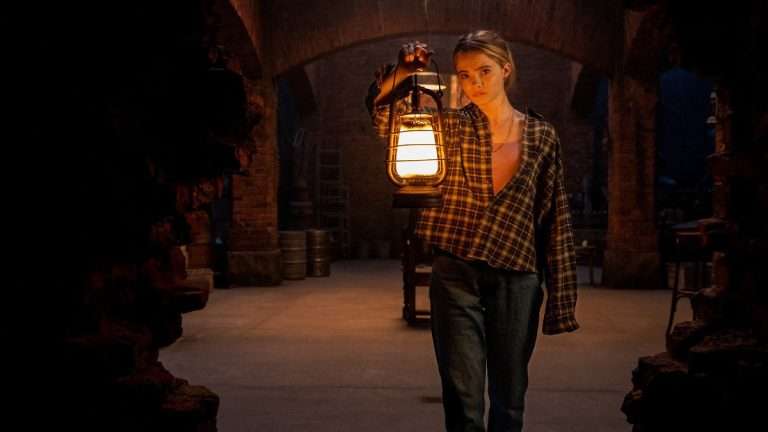Full River Red (2023) Movie Review: Zhang Yimou’s cinema demands a great understanding of the rich history of China. Add to the piece the twisted plot of a murder mystery, and it’s bound to leave most audiences confused. Luckily, then, his choices in treatment engage the viewer thanks to bouts of comedy and carefully worded dialogue that unravel the dense plot.
To comprehend the vast historical and political context the plot is mired in, we must first understand the setup, part of which Yimou provides in the opening title card. The film’s title, ‘Man Jiang Hong’ (The Whole River Red), is based on a poem attributed to Song Dynasty general and folk hero Yue Fei. The semi-fictional plot is set during the early years of the Song Dynasty, some years after corrupt government forces got Yue Fei killed. These forces include the Grand Chancellor Qin Hui (Lei Jiayin), a contemporary to Fei who is betraying the Song to their rivals in the Jin Dynasty.
Yimou does something stirringly magical in how he sets the narrative, excluding any outside elements and focusing on a murder at Qin Hui’s residence. Limiting the scope but not the scale showcases how the proceeding investigation unravels the truth of Hui’s deceptions. It’s clear that Full River Red is meant to incite a nationalistic treatise on loyalty to the nation, using Fei as a symbol of patriotism. The Chinese government’s own production company, China Film Group Corporation, distributes the film. Yet Yimou, by constraining the world of the plot and focusing on key players, attempts to make it about the themes of deception and bureaucratic corruption. This is easier said than done as Full River Red jumps across tones and genres, ultimately reaching its denouement.
Still, it is interesting to see the often self-serious filmmaker let loose, especially mocking the form of a historical piece with light brushes of comedy. He finds the perfect conduit in the form of Zhang Da (Shen Teng), the first suspect and eventual bumbling Detective on the case. It’s even a buddy cop comedy, as Da is paired with the hotheaded and ambitious Commander Sun Jun (Jackson Yee). Oddly, Sun Jun is not only Zhang’s uncle but also significantly younger than him.
The film has an odd mix of hilarity and thrills as the pairing wears each other down. Together, they also play an intricate game of chess with others in the grand fortress of the Chancellor. Characters such as the Chancellor’s right-hand man He Li (Zhang Yi), his subordinate Wu Yichin (Yue Yunpeng), and Zither (Wang Jiyai), a dancer girl, have their own motives and stakes in this mystery.
Yimou and his co-writer Chen Yu pepper the film with twist upon twist, where it admittedly becomes challenging to figure out the characters’ allegiances and endgame. The comedy really does much of the heavy lifting, especially in the first two acts of the investigation. The writing, anchored around the performance of Shen Teng, hops across different styles, from physical comedy to dialogue-based comedy. At one time, we see Zhang’s fool be subject to pratfalls and slapstick humor enhanced by the sound effects. The film goes above and beyond to sell the oddity of formality in a period setting.

Satire is a potent weapon Yimou and Yu use to truly question the roots of corruption, especially as characters reveal layers beyond their initial selves. The aforementioned use of sound is an incredible touch in a film with gorgeous craft, as one would expect of Yimou.
As a viewer familiar with Zhang Yimou’s oeuvre, especially his modern output, it’s easy to see how his 2018 film Shadow has changed his grasp on aesthetics. The ink-like stylization from that film is employed partially in this as well. Color plays an integral factor, and as such, grey shades are replaced by steel blue hues, with the majority of the picture taking place across one dangerous night. The bright red of the title only seeps in during the sunrise when the nation is awake to a united dawn, as well as to depict innocence blooming for a better future using cherries.
The symbolic parallels between a resurrected Song Dynasty and a rising China are undeniable, stripping the climax of any nuance. The sweeping camera that derives tension from soldiers walking across the labyrinthine fortress is then used to gloriously depict a united front for the dynasty when the root of corruption is dispelled from within.
In these moments, it is the aforementioned sound and soundtrack that becomes the real champion for Yimou’s efforts. There’s the energy of an anarchist buried within this film, and it comes forth in the musical choices made. Propelled by the twang of classical Chinese instruments, rock ballads disrupt and build tension as the mystery collapses. The twists that border on ridiculous clash with the score, as the comedy is also enhanced with cliché effects played from said instruments.
It feels as if Yimou is struggling with the film’s messaging while trying to balance between his art-house sensibilities and the film’s blockbuster aspirations. The latter eventually won out, of course, with the film becoming Yimou’s highest-grosser at the box office.
That last act of Full River Red is clearly a major reason, as every effort to make something fun is ultimately undone by heaps of melodrama. The shift in focus from Zhang’s subversive rebellion to Sun Jun’s arc of patriotic heroism leaves it with a bitter aftertaste. There’s an attempt at something wild, but it is clear Zhang Yimou is playing a rigged game of chess. This ultimately results in a confused film as a paean to the authoritarian rule behind it, poetically paralleling the jingoistic poem it is based on. The content, much like the poem, is vivid and gorgeous, but read further into it, and the subtext becomes troublesome.
★★★1/2
Read More: Monster (2023) Movie Review: A Richly Layered, Humanist Tale that Explores the Nature of Truth





![Take Me Somewhere Nice [2020] MUBI Review – ‘Stranger than Paradise’ with a female-gaze](https://79468c92.delivery.rocketcdn.me/wp-content/uploads/2020/05/Take-Me-Somwhere-Nice-highonfilms-768x432.jpg)
